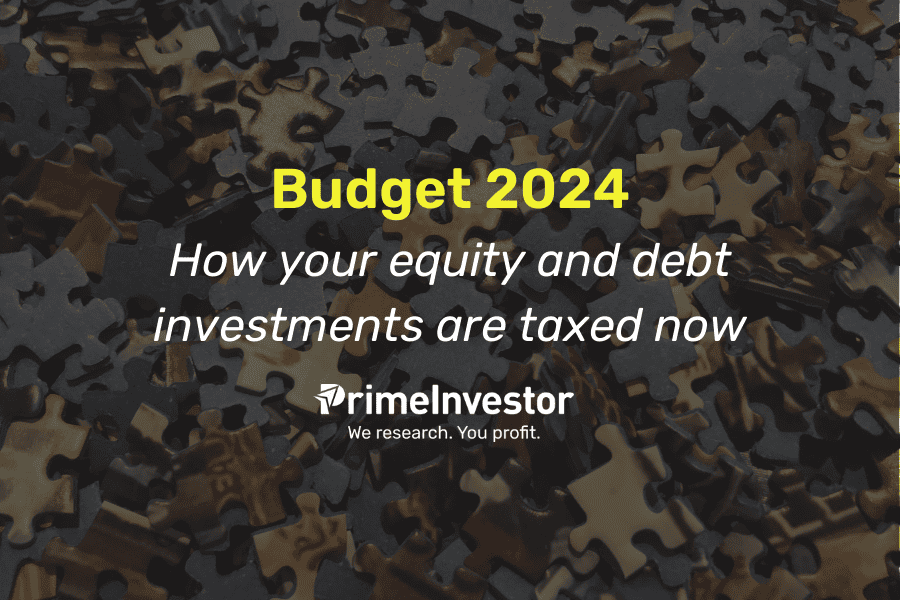The Union Budget of 2024-25 threw a massive surprise on capital gains taxation. Not just that, the new taxation rules have created a good amount of complexity over how mutual funds are now taxed – especially those that already saw a change in April last year and again now.
We have received several queries from you since the Budget, especially over how hybrid funds will be taxed. We also went to and fro right after the budget as some of the changes needed clarification. While there is still no written clarity from IT department, we have some clarity from AMCs on the changes.
Therefore, we are now putting down the taxation under different types of instruments and the scenarios you may wind up facing. You may consider this over any other varied version we may have mentioned (especially on MFs) on the day of Budget.

Use the Table of Contents below to navigate to the section in which you are interested. It can quickly get confusing otherwise!
The basics
Taxation of the different instruments, as changed in the budget, depend on three points:
- Whether it is a listed security: That is, is it bought and sold on exchanges. This will include stocks, bonds, REITs, InVITs and ETFs. For listed securities, a holding period of 12 months or lower is short term and above 12 months is long term. For unlisted instruments, a holding period of 24 months or lower is short term and above 24 months is long term. The only exception to this (according to AMCs) appears to be debt ETFs and FMPs.
- For a mutual fund, whether it is debt-oriented, equity-oriented, gold or international will determine the taxation. Pure equity and debt funds are easy enough, but for hybrid funds (including fund-of-funds and solution-oriented funds) the underlying portfolio allocation will determine its taxation.
- The date of purchase: For debt-oriented mutual funds, the tax depends on whether you invested in it before April 2023 or after.
Then, there are two kinds of income on your investments on which you are taxed:
- Income from your investments through dividends and interest: There is no change in tax rules here, these are simply added to your income and taxed at slab rates as they were previously.
- Capital gains from your investments when you redeem them: Capital gains can be short-term or long term. Definitions of both have changed, as has the capital gains tax rates. There are now only 2 periods for determining capital gains – 12 months and 24 months. There is no 36-month period and there is no indexation. We will explain more of this later. This change is effective for any sale made from July 23, 2024. Old laws will prevail for any sale made before that.
Stocks, equity funds & equity ETFs
These would include stocks and all equity fund categories, including equity index funds, and ETFs built on equity indices. These instruments haven’t seen much of a change in the taxation.
How they are taxed
The definition of short-term holding remains the same as earlier at 12 months. However, the short-term capital gains tax rate has increased from 15% to 20%. The long-term capital gains tax has increased from 10% to 12.5% – this is in line with the tax rate for listed securities. On the plus side, the exemption limit of capital gains has been raised to Rs 1.25 lakh from Rs 1 lakh.
Hybrid funds with >65% equity
When we say ‘hybrid’ here, we mean ANY mutual fund that invests in a mix of equity and debt (and gold or other commodities). Remember that ‘equity’ includes equity derivatives. The fund categories that fit the definition of holding 65% or more of their portfolio in equity are as follows:
- All arbitrage, equity savings and aggressive hybrid funds – by mandate, these funds necessarily need to hold at least 65% of their portfolio in equity instruments.
- Balanced advantage, solution-oriented & multi-asset funds – there is no mandate on how much equity these funds can have; each fund determines its own allocation. Therefore, where the gross equity (stocks plus derivatives) is at least 65%, they will fall in this bucket. Most balanced advantage funds tend to meet this 65% criteria. Some may have less than the 65% holding and would therefore not be taxed as ‘equity’. We will deal with them separately.
How they are taxed
For all these funds, the taxation in terms of holding period and rate of capital gains tax is the same as for equity funds as explained above – holding less than 12 months is short term and gains are taxed at 20%, above 12 months is long term and gains above Rs 1.25 lakh are taxed at 12.5%.
Debt funds and hybrid funds with >65% in debt
All pure debt mutual funds whether liquid, overnight, gilt or any other fall into this taxation bucket, as do FMPs and debt ETFs. With regard to hybrid funds, we again mean ANY mutual fund that invests in a mix of equity and debt. Hybrid funds that fall into this taxation bucket are as follows:
- All conservative hybrid funds – by mandate, these funds necessarily have to hold at least 75% in debt instruments.
- Solution-oriented & multi-asset funds – as mentioned above, each fund in these categories decides its own allocation and therefore, there may be funds where the debt allocation is above 65%. These will be defined as debt-oriented funds for the purpose of taxation. Do note that theoretically, balanced advantage funds may also fall into this bucket if their debt holding is over 65%.
The above two categories come under what is called as ‘Specified Mutual Funds’ under Section 50AA of the Income Tax Act, under which the tax rules are different from other mutual funds. You also have FoFs that invest primarily in debt funds, but we’ll get to that later!
How they are taxed
Taxation depends on when you invested in the fund. Remember that where you have made invested in the fund at different times, the first-in-first-out rule applies.
For investments made after April 1, 2023: There is no change here. As before, all capital gains are added to income and taxed at your slab rate. There is no concept of short term or long-term capital gains.
For investments made before April 1, 2023: There is a change in both holding period definition and tax rate. Short-term holding is now 24 months compared to the 36 months it was earlier. Short-term capital gains will be taxed at your slab rate – no change from before.
Holding for more than 24 months qualifies as long-term. Long-term capital gains will be taxed at 12.5% without indexation – the indexation benefit has been removed on long-term capital gains from now. Please note that if you had made investments before April 1, 2023 and sold it before July 23, 2024 (when new capital gains rates become effective), then 20% with indexation will apply for such debt-oriented funds, if you had held it for 36 months or more.
Hybrid funds with 35-65% in equity
This bunch of funds covers whatever is not an equity-oriented or a debt-oriented fund. Again, we mean ANY mutual fund that mixes equity and debt (and commodities such as gold) in their portfolio. Primarily, these funds would be:
- All balanced hybrid funds – this category by mandate should hold 40-60% in equity, with the remaining in debt
- Multi-asset, balanced advantage, solution-oriented funds that hold less than 65% in domestic stocks & equity derivatives and less than 65% in debt instruments.
Now, these funds were always taxed differently compared to equity-oriented and debt-oriented funds. What has changed in this budget is the holding period and tax rate.
How they are taxed
Short-term holding is now 24 months compared to the 36 months it was earlier. Short-term capital gains will be taxed at your slab rate – no change from before. Holding for more than 24 months qualifies as long-term. Long-term capital gains will be taxed at 12.5% without indexation – the indexation benefit has been removed on long-term capital gains from now. Please note that if you had sold before July 23, 2024 (when new capital gains rates become effective), then 20% with indexation will apply for such funds if you had held it for 36 months or more.
Fund-of-funds, international funds & gold funds
This is where the taxation starts getting complicated. These funds saw the first tax change in April 2023, when they were summarily swept under the new debt fund taxation rules (called Section 50 AA, Specified mutual funds). That is, for investments made after April 1, 2023, all capital gains were taxed at slab rates regardless of holding period.
This was because Section 50AA of the IT Act, which contained the new tax rules, simply termed all funds that were not equity-oriented funds as a ‘specified mutual fund’ and subjected to the new tax. The budget has now clearly defined a Specified Mutual Fund as a fund that invests at least 65% in debt instruments or invests in funds which in turn invest in 65% or more in debt instruments. That means the other fund categories – which are neither debt-oriented nor equity-oriented – will see yet another tax change.
These are the fund categories in question:
- Fund-of-funds: This category sports funds with an array of asset allocations. Taxation will thus boil down to the allocation of the funds the FoF invests in. FoFs investing above 90% in equity ETFs have always been taxed like equity funds and continue to be so. FoFs that invest 65% and above in debt funds (i.e., Specified Mutual Funds) will be taxed like debt funds. All other FoFs not falling in the 2 categories mentioned above will be grouped together now and taxed as given below.
- Gold funds
- International funds, whether they invest directly in overseas stocks or in overseas ETFs
What this means is that fund of funds, gold funds and international funds are excluded from the definition of ‘specified mutual funds’.
Now for some more complexity. The new Specified Mutual Fund definition is effective only from April 1, 2025. That means for the rest of this fiscal year, the funds above will continue to be taxed like they were before – which is that of debt funds. So, you have one type of tax rule for this fiscal year and a different rule from FY 25-26 onwards!
How they are taxed
To know the tax you have to pay, take the date of investment and the date of redemption.
- For investments made after April 1st, 2023 and sold before April 1st, 2025: Gains are simply taxed at your slab rate. There is no short-term or long-term here.
- For investments made before April 1st, 2023 and sold before 23rd July 2024: 20% with indexation will apply for this category (like debt funds), if you had held it for 36 months or more.
- For investments made before April 1st, 2023 and sold between 23rd July 2024 and April 1st, 2025: A holding period of less than 24 months is short term. Gains will be taxed at your slab rate. A holding period of more than 24 months is long term. Gains will be taxed at 12.5% without indexation.
- For investments at any time and sold after March 31, 2025: A holding period of less than 24 months is short term. Gains will be taxed at your slab rate. A holding period of more than 24 months is long term. Gains will be taxed at 12.5% without indexation.
Listed bonds, unlisted bonds, gold ETFs & international ETFs
The budget grouped all listed securities together and all unlisted securities together and then defined the short-term and long-term holding period for each group and the capital gains tax.
- Listed securities will thus cover stocks, REITs, InVITs, bonds (including government bonds), and ETFs. By this definition, gold and international ETFs will also fall into the listed securities group and share the same taxation.
- Unlisted securities are all others – bonds that aren’t listed, property, physical gold etc.
How they are taxed
For listed securities, short-term holding period is 12 months. Stocks, equity ETFs, REITs & InVITs will see gains taxed at 20%. Other instruments, such as bonds, gold & international ETFs will have gains taxed at slab rate. Long-term holding period is above 12 months. Long-term capital gains up to Rs 1.25 lakh is exempt from tax for stocks, equity ETFs, REITs & InVITs. The remaining gains for these and the other listed securities will be taxed at 12.5% with no indexation.
For unlisted securities, short-term holding period is 24 months and gains are taxed at slab rates. Long-term holding period is above 24 months and gains are taxed at 12.5% with no indexation.
Now here are the tax differentials within the same asset class that makes for an undue tax arbitrage:
- Effective April 1, 2025, gold and international funds with 24-month holding or more will be taxed at 12.5%. But Gold and international ETFs will have a lower holding of 12 months to be classified as LTCG, although taxed at the same 12.5%. This gives a time advantage to ETFs over their fund counterparts.
- The second puzzle is with debt ETFs. Here again, the ‘listed’ definition should strictly include debt ETFs as well. But as an asset class and nature of instrument, they are on par with debt funds. While there has been no official clarification on this front, from tax notes put out by AMCs, it appears that debt ETFs will be taxed like debt funds and not like listed securities.
It remains to be seen whether there will be a change later down the line to bring the parity in the tax treatment, so do be prepared.
The table below summarizes the different rules. We hope it helps!
What the new taxes mean for you
The new tax rules aim to streamline holding period definitions and rates across asset classes. Whether or not it does so is a separate debate. So, putting that aside, the takeaways for you from the new rules are as follows:
- Bonds are more tax-efficient compared to debt funds. Even earlier, the tax rules for debt funds made them less attractive – it is even more so now given that even unlisted bonds have seen long-term holding period shrink to 24 months and tax rate dropped to 12.5% (though indexation has been removed). Listed bonds were already at an advantage and continue to be so. Therefore, there is a stronger case for you to divert a part of your debt allocation to bonds. But we do not recommend replacing your entire debt fund investments with bonds. For one thing, interest income on bonds is taxed in the year of accrual, unlike debt funds where you pay the tax only on redemption. More importantly, actively managing a bond portfolio on your own is a tall order. It requires you to closely track bond issues, assess the quality of the issuers, know which maturity to go for given the rate cycle and the other bonds you hold, and reinvest maturity proceeds promptly. Debt funds do this job for you. This apart, you do not really have a good range of bonds available for investment – debt funds have a bigger variety to tap. For high-yield bonds, you often have the bonds pay out interest to you and do not have cumulative option available – this both affects compounding and requires you to track interest payouts and reinvest the same.
- International funds become a more efficient option now. Diversifying into international funds was always a good strategy and we recommended these even when the tax rules were onerous. For those of you who avoided these funds because of their taxes, you can certainly look at these again. Of course, the challenge is that many funds are still restricting inflows! ETFs appear to be a superior alternative to funds, but one, we cannot say for certain that tax treatment will remain the same and two, the variety that funds offer is much more. You can go for ETFs over funds if you’re willing to chance the tax impact.
- Gold ETFs are better than gold funds. Gold funds typically invest in gold ETFs. In tracking error, thus, ETFs are better than funds. Assuming the new taxes remain and the definition of listed securities includes gold ETFs, ETFs are the clear superior choice if you want to invest in gold. But even in the event that taxes change, ETFs are still worth investing in over funds owing to their better tracking error.
- Fund-of-funds remain avoidable. It is true that taxation on these funds will see some reduction in the case of equity-dominant FoFs. But even so, we do not recommend investing in these or any FoF in general (except those that invest international ETFs or debt ETFs, since they are in essence international funds or debt funds and not an actual FoF). For one, FoFs don’t add anything new to your portfolio – you can well invest the underlying funds yourself. Two, they take away your control over which fund to invest in, how much you can allocate to them and tailor it to your risk and portfolio. Three, when it comes to equity, they are still less efficient than other equity-oriented funds.
- Equity funds & stocks will see higher tax outgo, both in short-term and long-term periods. However, this is par for the course and should not be a reason to continue holding on to underperformers or avoid rebalancing. The increase in exemption limit means that long-term gains up to Rs 125,000 will actually see a lower outgo or no change.
- Finally, get used to taxes changing on your investments. Avoid using tax treatment as the main reason for your fund choices as these are always subject to change.




29 thoughts on “Budget 2024 – how your equity & debt investments are taxed now”
Hello, Request guidance if deduction under section 54F can be claimed for capital gains from debt mutual fund investments made before April 1, 2023?
Not sure if this deduction will be available for debt funds, since the definition of capital gains has changed…so we cannot definitively say what the treatment will be for investments made before April 2023. Please check with your auditor or a tax expert for the correct interpretation. – thanks, Bhavana
if i have done the investments in Equity FOF in June 2022 and i sell it on 01/10/2024 then what would be the taxation?!
If your equity FoF has invested at least 90% in equity ETFs, then equity tax applies. Otherwise, please refer to the section “Fund-of-funds, international funds & gold funds”. The taxation that applies based on the date of purchase and redemption is explained there. – thanks, Bhavana
Hi, please guide on NRI Taxation, it is not covered in the above discussion.
They are the same except that there is TDS for NRIs. And for DTAA you would need to check with your auditor based on your country of residence.
I just received an email from Mirae Asset MF. According to mail:
Short Term gains on Fund-of-funds would be 20% whereas your article above says at Tax Slab rate. I am talking about “International funds & gold funds. Fund-of-funds, where underlying funds are <65% in debt*" specifically Mirae Asset Nifty 200 Alpha 30 ETF Fund of Fund.
The Mirae Alpha 30 ETF FoF will be treated like an equity fund and therefore STCG is 20%. FoFs that invest at least 90% in equity ETFs are equity for the purpose of taxation. This is explained in the first bullet point in the ‘Fund-of-funds, international funds & gold funds’ section. – thanks, Bhavana
What happens to Gilts & SDLs? SDLs i think get listed too? Do they get LTCG benefit for capital appreciation. I understand interest will taxed at slab rates
Yes, GSecs & SDLs are listed and if you sell these bonds, LTCG @ 12.5% will apply after 12 months’ holding. – thanks, Bhavana
Comments are closed.